
The red underwing is a moth of the family Erebidae. The species was first described by Carl Linnaeus in his 1767 12th edition of Systema Naturae.

Catocala is a generally Holarctic genus of moths in the family Erebidae. The genus was erected by Franz von Paula Schrank in 1802. The moths are commonly known as underwing moths or simply underwings. These terms are sometimes used for a few related moths, but usually – especially when used in plural, not as part of a species name – they are used to refer to Catocala only.
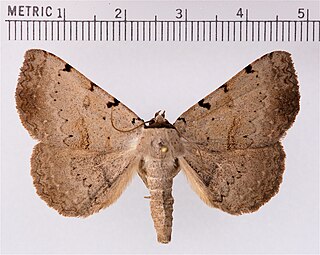
The Catocalini are a tribe of moths in the family Erebidae. Adults of many species in the tribe are called underwing moths due to their vividly colored hindwings that are often covered by contrastingly dark, drab forewings.
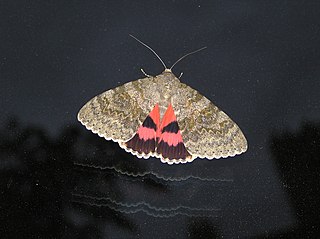
Catocala elocata, the French red underwing, is a moth of the family Erebidae. It is found in Central Europe, Southern Europe, North Africa, Anatolia, Uzbekistan, and Kazakhstan.

Catocala fulminea, the yellow bands underwing, is a moth of the family Erebidae. The species was first described by Giovanni Antonio Scopoli in his 1763 Entomologia Carniolica. It is found in central and southern Europe, east Asia and Siberia. The xarippe lineage has been proposed to be a distinct and valid species in its own right, instead of being only subspecifically distinct.

Catocala promissa, the light crimson underwing, is a moth of the family Erebidae. The species was first described by Michael Denis and Ignaz Schiffermüller in 1775. It can be found in Europe and Anatolia up to Armenia.
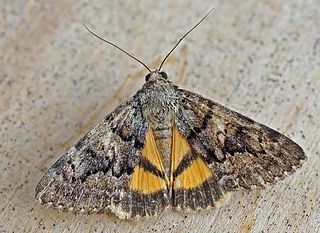
Catocala nymphaea is a species of moth of the family Erebidae. It was described by Eugenius Johann Christoph Esper in 1787. It is found in southern France, Austria, Albania, Portugal, Croatia, Italy, Greece, Corsica, Sicily, Crete, North Africa, Anatolia, Afghanistan and Kashmir.
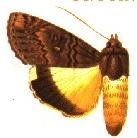
Ulotrichopus is a genus of moths in the family Erebidae. The genus was described by Wallengren in 1860.

Catocala amestris, the three-staff underwing, is a species of Catocalini that occurs in North America. It is considered endangered and is legally protected in the state of Michigan.
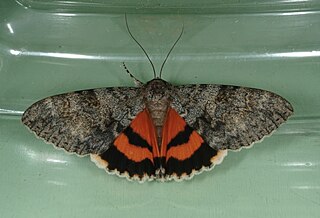
Catocala amatrix, the sweetheart underwing, is a moth of the family Erebidae. The species can be found from Nova Scotia, south through Connecticut to Florida and west through Texas and Oklahoma to Arizona and north to Montana, Minnesota, and Ontario.

Catocala retecta, the yellow-gray underwing, is a moth of the family Erebidae. The species was first described by Augustus Radcliffe Grote in 1872. It can be found in North America from southern Ontario and Quebec south through Maine and New Jersey, south through Tennessee to Georgia and west to Arkansas and Kansas and north to Wisconsin. There is one recognised subspecies, Catocala retecta luctuosa, which is sometimes treated as a valid species with the common name yellow-fringed underwing.

Catocala whitneyi, or Whitney's underwing, is a moth of the family Erebidae. The species was first described by G. M. Dodge in 1874. It is found in North America from North Dakota, Nebraska, and Kansas eastward through Wisconsin to Ohio and Tennessee. It has also been recorded as far west as Minnesota and Utah. In Canada, it has been found in Manitoba.

Catocala junctura, the joined underwing or Stretch's underwing, is a moth in the family Erebidae. The species was first described by Francis Walker in 1858. It is found throughout temperate North America, ranging from New York and Pennsylvania west to Montana, Colorado, Oklahoma, Arizona, and into Texas, and north to southern Illinois, extreme southern Alberta and Saskatchewan; it has also been recorded west of the Rocky Mountains from California and south-eastern British Columbia. It is typically found near water, where the food plants of its caterpillar larvae grow plentifully.

Catocala ultronia, the dark red underwing or ultronia underwing, is a moth of the family Erebidae. The species was first described by Jacob Hübner in 1823. It is found in most of eastern North America, south to Florida and Texas. It ranges west across the southern parts of Canada to extreme southeast British Columbia.

Catocala conversa is a moth of the family Erebidae first described by Eugenius Johann Christoph Esper in 1787. It is found in the Mediterranean zone and parts of the sub-Mediterranean zone.
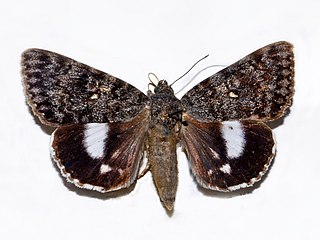
Catocala actaea is a moth of the family Erebidae first described by Rudolf Felder and Alois Friedrich Rogenhofer in 1874.
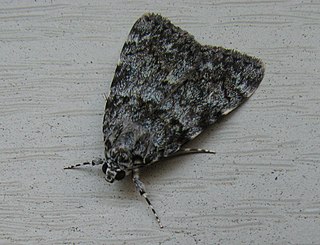
Catocala lineella, the lineella underwing, little lined underwing or steely underwing, is a moth of the family Erebidae. The species was first described by Augustus Radcliffe Grote in 1872. It is found in North America from Ontario and Quebec south to Florida west to Texas and north to Ohio.

Catocala dejeani is a moth of the family Erebidae first described by Rudolf Mell in 1936. It is found in China and Taiwan.
Catocala dissimilis is a moth of the family Erebidae. It is found in Russia, China, Korea and Japan.

Catocala lupina is a moth in the family Erebidae first described by Gottlieb August Wilhelm Herrich-Schäffer in 1851. It is found from south-eastern Europe to south-western Siberia, Asia Minor and Transcaucasia.

















